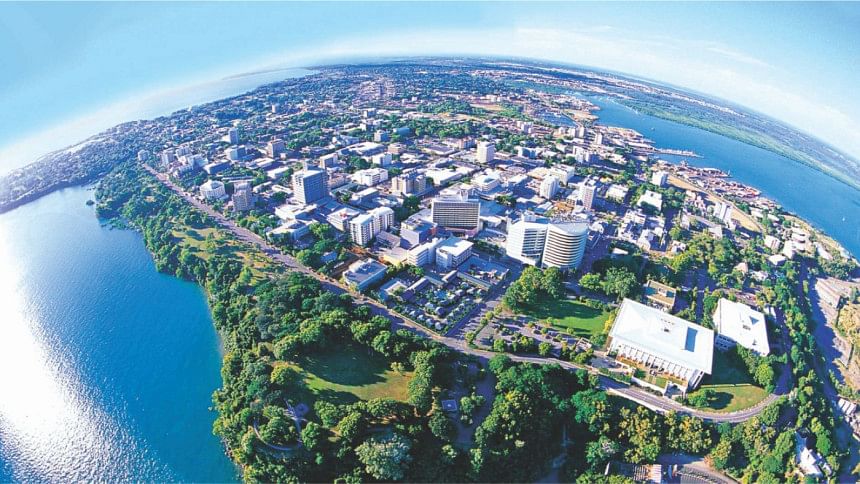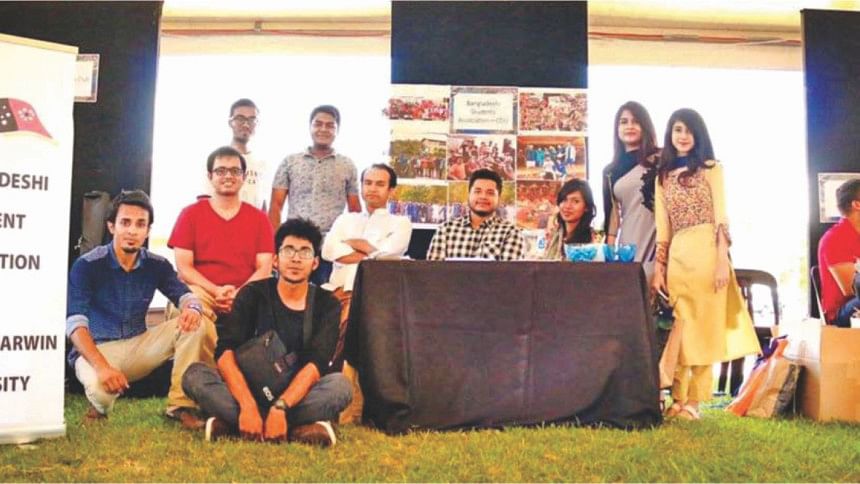Darwin: The portal to Asia

Tucked in a remote corner at the tip of the Northern Territory (NT), Australia, lies a little known city called Darwin—first named in 1839 by John Lort Stokes after his former shipmate and evolutionist Charles Darwin. Home to the majority (a little over 140,000) of the meagerly populated state, Darwin is famous for its native wildlife, stunning lightning storms and Aboriginal art and culture.
But the capital of the NT is far from a sleepy backwater and is more than just an "exotic" tourist haven. If you, as a non-Australian, thought otherwise, you would be forgiven for doing so because Australians themselves have very little idea about the NT and Territorians (as residents of the NT are known) are used to being snubbed by politicians, entertainers, and their own countrymen down south.
When you look closer, you see an emerging pattern of migration from Bangladesh to this quiet city in the outback—especially in the last three to four years. The number of immigrants of Bangladeshi origin in Darwin is modest—no more than a thousand. Many of them are first or second generation immigrants who moved here from big cities like Sydney, Melbourne and Brisbane. The rest of them are students at Charles Darwin University, the only university based in the NT, and the driving factor behind the number of Bangladesh-born immigrants almost doubling in Darwin in the last four years.

A woman in her early 40s whose father came to Australia from Bangladesh in the 1960s tells me that Bangladeshis here have carved out a little, tight-knit community of their own. They find little joys in organising pitha utshabs and celebrating national observance days like Bijoy Dibosh. She tells me that far from feeling alienated or isolated, the Bangladeshi diaspora crave the hassle-free, laidback lifestyle in Darwin—a far cry from the chaotic urban life in Dhaka.
" When you look closer, you see an emerging pattern of migration from Bangladesh to this quiet city in the outback—especially in the last three to four years. The number of immigrants of Bangladeshi origin in Darwin is modest—no more than a thousand.
As one of the largest cities in the Top End and hailed as Australia's "gateway to Asia", Darwin (and the NT as a whole) is integral to the country's future economic development. Despite comprising over 50 percent of the country's landmass, Northern Australia hosts only 5.5 percent of Australia's total population of 24 million. The discrepancies between Northern and Southern Australia are too large, which is why the Australian government is looking towards the north to lead the growth momentum and ease the pressure on big metropolises like Sydney and Melbourne in the south.
In all this, immigration to the NT from South and Southeast Asia will play a crucial role and Australia's immigration policies reflect this north-south dichotomy in light of the Turnbull administration's overhaul of the migration process. The raft of proposed changes to citizenship laws that include increasing the permanent residency requirement (from one year) to four years and tougher English proficiency tests, and the controversial move to do away with the 457 visa programme—an employer-sponsored skilled migration visa that allowed foreign workers to live with their immediate family—are a clear sign that the immigration issue is high on the agenda.
On the flipside, however, the Northern Territory's state sponsorship programme that grants five extra points on some visas is a marked departure from the federal government's policies. (Many Bangladeshis opted to migrate to the NT for this reason alone.) The message is clear: the north wants more people and the south wants less, which explains why migrants from our region are eyeing the population-starved NT due to it being an easy entry point.
Behind the stories of economic development, immigration and people-eating crocodiles, however, is a larger, more complex dynamic. Darwin is a key defence hub indispensable to both Australian and American security interests. When North Korea recently claimed that it had launched long-range intercontinental ballistic missiles, which reportedly landed in the Sea of Japan, Darwin was in the direct line of fire. Although US military presence in Darwin is nothing new, escalating tensions between the US and North Korea and the increasing militarisation of Darwin have given the latter renewed geopolitical importance. This is not the first time that the city has been a flashpoint of conflict between larger powers. The Japanese bombed it in two waves during WWII—now referred to as "Australia's Pearl Harbor".
As the Australian government shifts its focus to the long-ignored, under-developed north, a huge burden of charting its future lies with migrants. With western countries tightening their borders, Northern Australia (and Darwin still undergoing its post-war transformation) remains an exception to the norm, wherein lies huge prospects for labour-sending, populous states like Indonesia and Bangladesh.
Nahela Nowshin is a member of the editorial team at The Daily Star.

 For all latest news, follow The Daily Star's Google News channel.
For all latest news, follow The Daily Star's Google News channel. 



Comments